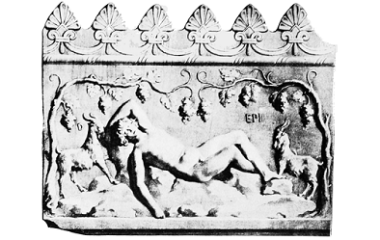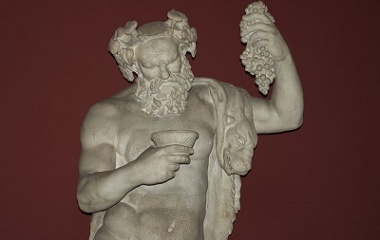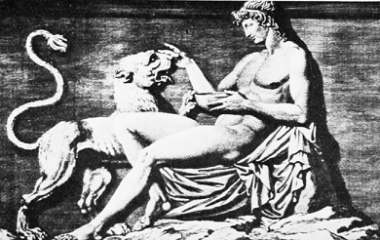Who Is Dionysus?
Dionysus was the love child of Zeus and Semele. An interesting fact about the god is that he was the only god to have a mortal parent, as Semele was a mortal.
Origins
Dionysus’ origins are a little difficult to interpret. It is speculated that his name is a combination of his father’s name, Zeus, and Nysa, the name of the mountain where Dionysus was born and grew up on.
Legends and Stories
There are several myths involving Dionysus, some of which are still popular tales today, even if they don’t specifically mention Dionysus.
The Birth of Dionysus
There are two versions regarding the birth of Dionysus. They both tell us that Dionysus was the result of an affair between the god Zeus and a mortal named Semele. Hera, Zeus’ wife, became insane with jealousy over her husband’s affair and vowed to seek revenge. She approached Semele without revealing who she was and befriended her. After discussing her lover, Semele was asked to prove that she really was Zeus’ lover by demanding him to appear in his godly form. Zeus begged her not to make him do this but Semele persisted. Eventually, Zeus showed himself and because mortals are unable to look at a god without perishing, Semele died with her first gaze on Zeus.
Zeus was devastated and immediately swept up his son’s body and sewed it onto his thigh. Dionysus remained there for several months until he was ready to be born.
In another version, Hera instead tried to kill Dionysus after he was born. She sent the Titans to fulfill her demand and they ripped the young boy’s body apart. Zeus fought the Titans using his thunderbolts but it was too late. All that remained of his son was the heart. Depending on the source, Zeus either used the heart to generate another Dionysus and placed him in the womb of Semele to be reborn or he had Semele eat the heart. Either way, both versions of the myth of Dionysus’ birth have him being reborn, which made his myth very attractive to several religions.
Dionysus’ Travels
Zeus decided to put the rain-nymphs in charge of raising his infant son. After proving they were dedicated to the success of the child, Zeus rewarded them by turning them into a star cluster. As the boy grew, he was introduced to the making of wine and the culture that surrounded it. Hera was still upset that the proof of her husband’s infidelity existed though and sought revenge one last time, striking Dionysus with madness. He wandered the earth for years until Cybele, a goddess, cured him. She taught the young man her religious rites and he began to travel with purpose now, teaching others how to make wine. It is said that he spent several years in India, teaching the population everything there was to know about wine. As he returned to Greece, he was greeted with mixed emotions as the madness that once struck him had tarnished his reputation.
The Midas Touch
We’ve all heard the tale of the king with the golden touch but not many realize that it has Greek mythology roots. Dionysus spent his childhood being mentored by a man named Silenus. One day, Silenus went missing. He had been drinking and it was assumed that he had wandered away. Dionysus, now a grown man, set out to find him.
His assumptions were right. Silenus had wandered off in a drunken stupor and had passed out in a king’s garden. King Midas found him and recognized him. He treated Silenus kindly and allowed him to stay with him for 10 days, entertaining him, feeding him and clothing him. He then brought Silenus back to Dionysus, who was thrilled to know that his mentor was safe.
To repay him, Dionysus offered King Midas a wish as a reward. King Midas asked that he be given the power to turn anything he touched into gold. Dionysus was disappointed with his superficial wish but granted it for the king. King Midas was ecstatic with his new power and quickly tested it. He first turned a twig into gold and then did the same to a rock. He quickly headed home, eager to share his gift with others.
He quickly realized the error in his wish though. He tried to eat but turned his bread and meat into gold. He went to embrace his daughter, and turned her to gold instantly. He reached for a glass of wine to calm his nerves but that too turned to gold. He prayed to Dionysus and begged him to allow him to eat. He begged the god to reverse the gold curse on his daughter. Eventually, Dionysus consented to the king’s pleading demands. He told the king to go and wash himself in the river Pactolus. The king obliged and when he entered the water, his gift was passed onto the water. The sand on the banks of the river turned into gold, which is the explanation given to those who wonder why so much gold has been found in the river Pactolus.
Family
Even though Dionysus traveled the world, he still married and had children. It is said that he had relationships with both Nyx, the goddess of the night, and Aphrodite, the goddess of love. But he married Ariadne, the princess of Crete, and they had several children, with the most famous being Priaus, Phthonus and Deinira.
Appearance
Dionysus is usually depicted as a very attractive man, especially in his younger years. He is usually shown with a crown of vines and grapes around him, representing his love and talent for making wine. He is also usually shown with a tremendous amount of hair, with long locks that fall below his shoulders. In most artistic representations, he is also pictured with a staff that was wrapped in ivy leaves and topped with a pine cone.
Symbology
Dionysus’ main symbol is wine. He demonstrated a dual nature, which many say is a direct representation of the good and evil of wine. Dionysus was known to bring happiness and joy to those around him as he was very lighthearted and was always willing to offer help to anyone who needed it. But if agitated, he could also represent rage and even brutality.










